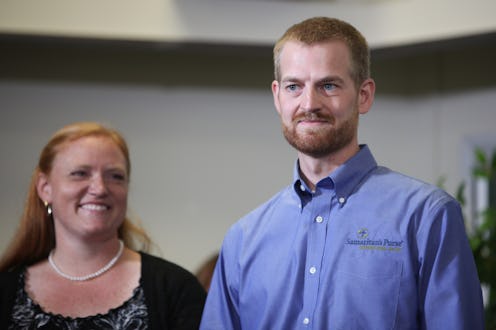News
He's Been Cured Of Ebola
Today, after two weeks of breath-held waiting, Emory University Hospital announced that American Ebola patients Dr. Kent Brantly and Nancy Writebol have been cured and released from the hospital. Writebol was allowed out of the hospital on Tuesday; Brantly was released early Thursday. "Today is a miraculous day. I'm thrilled to be alive," Brantly said at a press conference, his eyes filled with tears. The burning question now, of course: How did these patients recover from the incurable virus? The unsatisfying answer: No one's quite sure.
Ebola, the terrifying virus that has even been compared to the Black Death, has no known cure. That being said, certain treatments — like monitoring vital signs, making sure the patient gets enough nutrition and fluids— significantly help recovery. In fact, almost half of those infected in Liberia, Sierra Leone, Nigeria and Guinea survive. The scary statistic — 90 percent fatality rate — is only for those who are untreated. As it stands, over 1,350 have died since the Ebola virus swept across West Africa in March.
Both Brantly and Writebol, being treated at Emory's specialized intensive care unit for infectious diseases, had access to high quality care. But they were also both given a dose of an experimental treatment — Zmapp — which had never before been tried on humans. Brantly also got a blood transfusion from someone without the virus. Which of these treatments ultimately led to the patients' recovery, no one can tell.
"If the question is, 'Did Zmapp do this?' The answer is that we just don't know," says Anthony Fauci, director of the National Institute of Allergy and Infectious Disease. "People who are in much less sophisticated medical care conditions in West Africa are recovering 50 percent of the time."
Still, Emory might consider turning to experimental drugs again: "We have had many communications with the FDA over the last three weeks, and that [experimental agents] would be a consideration," the director of Emory’s Infectious Disease Unit, Dr. Bruce Ribner, said at a press conference Thursday. But "even going into this, we knew that the key to resolving Ebola infection was aggressive supportive care."
Regardless, according to Ribner, the two patients are now healthy, safe, and virus-free. “After a rigorous and successful course of treatment and testing, the Emory Healthcare team has determined that both patients have recovered from the Ebola virus and can return to their families and community without concern for spreading this infection to others,” he said.
As to the risk of a relapse? Next to nothing, according to Ribner. Two blood tests were done in order to confirm that the two U.S. patients were virus-free; both came back negative.
Image: Getty Images, ThisHour/Twitter
